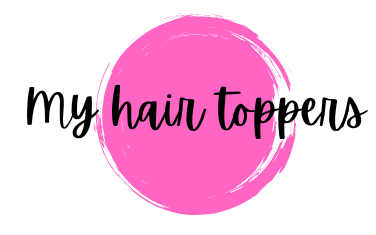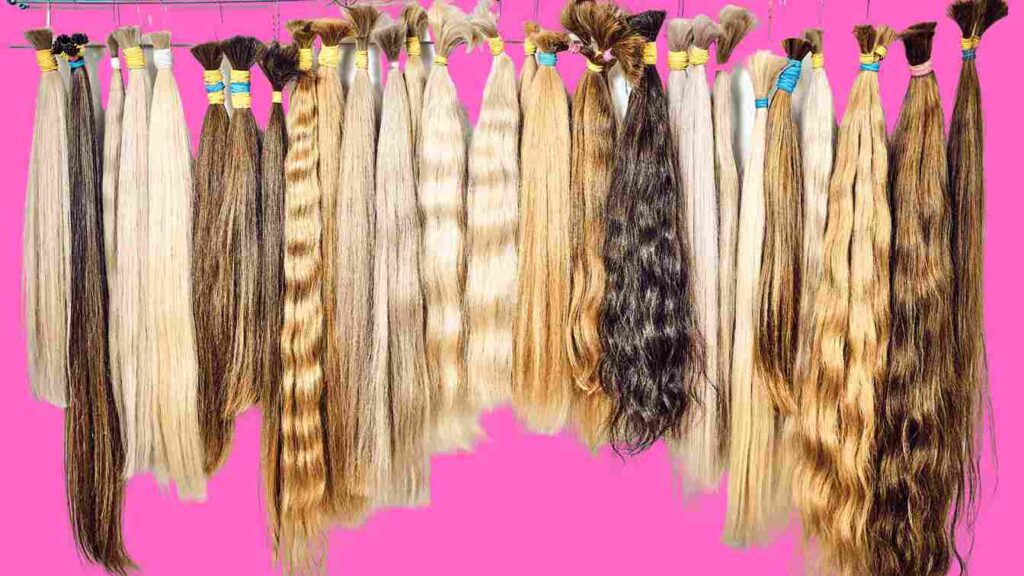
Are your Human Hair Toppers and wigs ethically sourced?
The Importance of Regulation in a Shady Industry.
Ensuring that the human hair used in hair toppers, wigs, and extensions is ethically sourced is crucial. By doing so, we can support fair labor practices, protect individuals and communities, and promote sustainable and safe products. It’s up to us as consumers to demand transparency and hold companies accountable for where they source their hair.
Table of Contents
As someone who has worked in the hair industry for several years, I’ve seen firsthand the lack of regulation and transparency when it comes to sourcing human hair for hair toppers, wigs, and extensions. While some countries have strict regulations in place, others have little to no oversight, creating a breeding ground for unethical practices.
Many people who purchase wigs, human hair toppers, or extensions don’t seem to be too bothered about the ethics of where the hair comes from or how it’s obtained. It’s common knowledge that most of the human hair used in wigs is sourced from India and China, but what many people don’t know is that only a small percentage of that hair comes from temples.
The rest of the hair is obtained from unknown sources, which raises serious questions about the ethics of the wig industry.
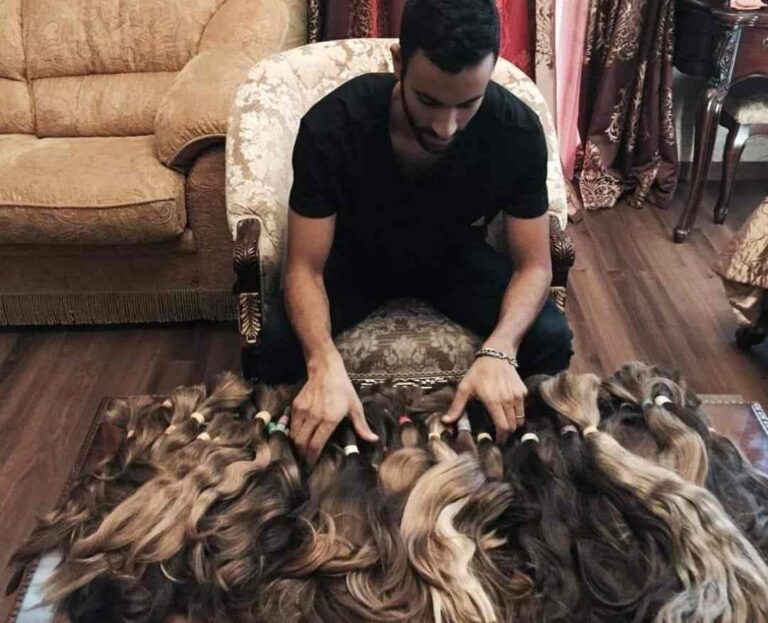
It’s important to understand the impact of sourcing hair unethically. In some cases, the hair is taken from individuals without their consent or knowledge, and they are often paid very little or nothing at all. This exploitation can have devastating effects on both the individuals and the communities they come from. Additionally, hair that is not ethically sourced can be processed with harmful chemicals, putting both the wearer and the environment at risk.
Key Takeaways
The hair industry lacks regulation and transparency when it comes to sourcing human hair for hair toppers, wigs, and extensions. Unethically sourced hair can have negative impacts on individuals, communities, and the environment. It’s important to demand transparency and support companies that source their hair ethically.
Human Hair Toppers and Wigs: Understanding where they come from.
On a personal note, I came to understand the importance of ethically sourced hair when I first opened my online store back in 2017. I needed to ensure that the hair used in the wigs and toppers I was selling, was obtained through ethical means. Unfortunately, not all human hair toppers, wigs, and extensions are ethically sourced. Some hair is obtained through exploitative means like forced labor or trafficking.
It is crucial to do research and choose a reputable supplier that can provide proof of ethical sourcing practices.
As a consumer, it is as important to do your research and choose a retailer that is transparent and can provide proof of ethical sourcing practices.
Why is Important?
There are a few reasons why ethically sourced human hair is so important.
Firstly, it ensures that the people from whom the hair is sourced are treated fairly, with respect and receive adequate compensation. Hair is often sourced from developing countries, where poverty is widespread and people may be vulnerable to exploitation. By ensuring that the hair is ethically sourced, we can help to support these communities and ensure that they are not taken advantage of.
Secondly, ethically sourced human hair is often of a higher quality than hair that has been obtained through unethical means. This is because the hair is typically sourced from individuals who have taken good care of their hair and have not been subjected to harsh chemicals or other damaging treatments. As a result, the hair is healthier, stronger, and more durable.
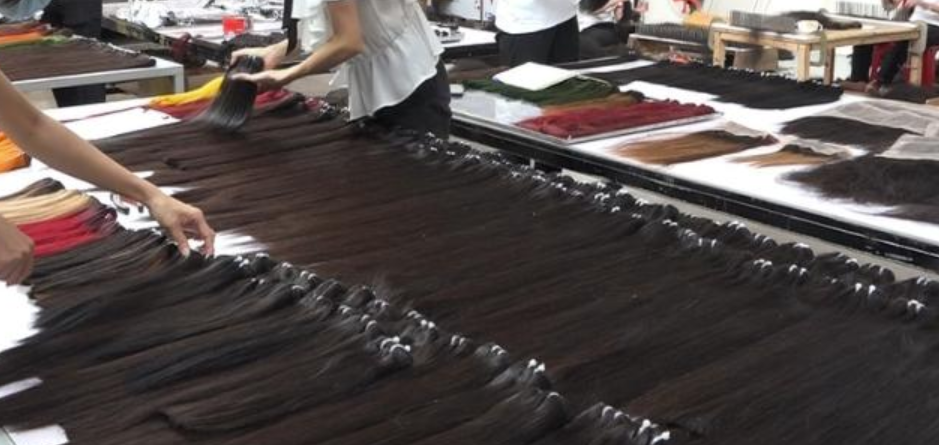
Finally, using ethically sourced human hair can help to promote sustainability in the hair industry by promoting more responsible practices.
Whether you are purchasing a women’s hair topper, a wig, or extensions, it is essential to ensure that the hair has been obtained ethically and sustainably.
By doing so, we can help to support communities, promote sustainability, and ensure that the hair we use is of the highest quality.
INDUSTRY INSIGHTS:
China and India have experienced impressive economic growth in recent years, which has brought greater prosperity to their populations. But unfortunately, this growth has also resulted in a decline in the number of people willing to donate their hair. This has made it harder to obtain human hair to produce wigs and extensions.
Consequently, companies are now seeking new ways to produce high-quality wigs and extensions that can be styled just like real human hair. This shift in the industry is expected to persist, as the demand for wigs and extensions remains strong, while the supply of human hair continues to dwindle.
The Dark Side of the Hair Industry
As I research the human hair used for hair toppers, wigs, and extensions, I cannot ignore the dark side of the hair industry I got to learn about. The hair industry is quite shady, with not much regulation in certain countries.
The demand for human hair, unfortunately, has led to a rise in unethical practices, including forced labor, exploitation, and even theft. In some cases, women are forced to sell their hair for a meager price, while in other cases, their hair is stolen without their knowledge or consent.
One of the biggest culprits of unethical hair sourcing is China, which accounts for over 80% of the world’s hair market. In China, hair is sourced from hair salons, temples, and even prisons. The hair is often unethically sourced, with little regard for the women who provided it, to the point that the US government is investigating certain Chinese factories that provide the American market with large quantities of hair.
Another issue in the hair industry is the lack of transparency. Many retailers claim to use “ethically sourced” hair, but it is hard to verify these claims. The lack of regulation in the industry makes it difficult for consumers to know where their hair is coming from and whether it was ethically sourced.
In conclusion, human hair toppers, wigs, and extensions must be ethically sourced.
The dark side of the hair industry cannot be ignored, and consumers must do their research before purchasing hair products. As a responsible consumer, I will only support companies that are transparent about their sourcing and ensure that their hair is ethically sourced.

Regulations in the Hair Industry
Unfortunately, most of the time, unethical practices go unnoticed and unpunished.
For example, a lot of hair used in human hair toppers, extensions and wigs come from India, where there is no official governing body to oversee the hair trade. This means that there is no way to ensure that the hair was ethically sourced.
Additionally, in countries where there are regulations in place, they may not even be enforced.
For instance, China has regulations regarding the export of human hair, but there have been many reports of hair being smuggled out of the country illegally.
It is important for consumers to be aware of these issues and to do their research before purchasing hair products. Some companies have taken it upon themselves to ensure that their hair is ethically sourced, but it is up to the consumer to verify these claims.
Overall, the lack of regulation in the hair industry is concerning, and it is up to each one of us to educate ourselves and make informed decisions about the products we choose to use.
Is your Human Hair Topper or wig from India?
Is your Human Hair Topper or wig from India?
India is one of the largest exporters of human hair, and most of the hair comes from Hindu temples where people donate their hair as a religious offering. However, some unethical vendors collect hair from the streets, barbershops, drains and even from corpses. And if you are wearing a human hair topper or wig, you may have it on your head right now. To avoid supporting these practices, it’s important to look for vendors that have a transparent supply chain and can provide proof of ethical sourcing.
Is your Human Hair Topper or wig from China?
In the last years, In China, there have been many reports of forced labor and human rights violations.
It’s crucial to do your due diligence and research before purchasing your human hair topper or wig from China.
Look for retailers that have certifications for ethical sourcing, such as the Global Organic Textile Standard (GOTS) or the Responsible Down Standard (RDS).
Is your Human Hair Topper or wig from Brazil?
Brazil is known for its high-quality hair, but the industry is not without its ethical concerns. Some vendors collect hair from impoverished communities without proper compensation or consent. Look for vendors that work directly with hair donors and provide fair compensation for their hair.
In conclusion, ethical sourcing is crucial and at this point, it is essential to research the company you are purchasing from and ensure that they have a transparent supply chain and can provide proof of ethical sourcing. By doing so, we can support ethical practices and ensure that we’re not contributing to the exploitation of vulnerable communities.
Impact of Unethical Practices
One of the most significant impacts of these unethical practices is the exploitation of individuals who are often in dire financial situations. In some cases, hair is sourced from individuals who are living in poverty and are desperate for money. These individuals are often paid close to nothing for their hair, and the money they receive is not nearly enough to improve their financial situation. This is a clear example of exploitation!
Finally, unethical practices in the hair industry can also lead to health concerns. Often, low-quality hair is treated with various chemicals and other harmful substances to look smooth and soft. This can lead to serious health concerns for certain people due to the toxicity of the products.
Tips On How To Ensure That The Hair Used is Ethically Sourced
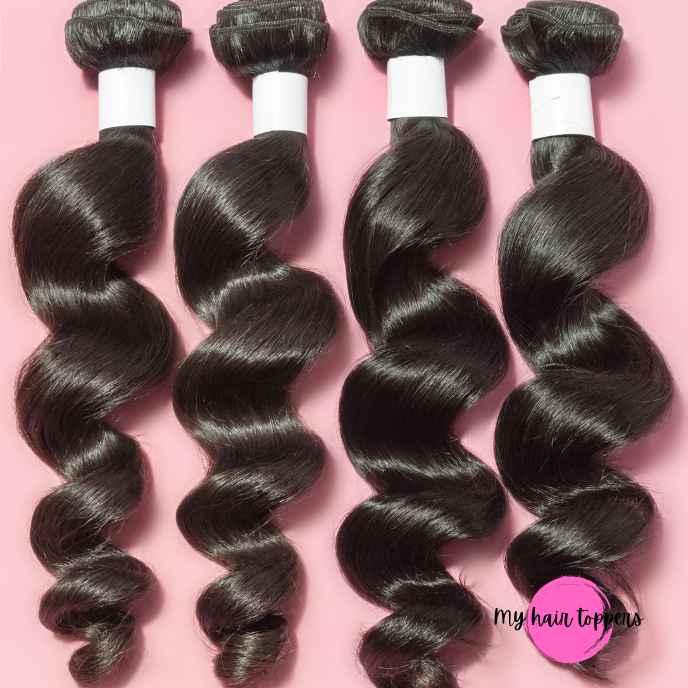
EDITOR’S NOTE: As someone who cares about ethical sourcing, I understand the importance of knowing where my human hair toppers and wigs come from.
Overall, unethical practices in the hair industry have a significant impact on individuals, the environment, and health. We must work together to address these issues and ensure that the hair industry is regulated and ethical practices are enforced.
1. Research the company: Before making a purchase, it’s important to research the company you’re buying from. Look for information on their website about where they source their hair from and whether they have any ethical sourcing policies in place.
2. Check for certifications: Look for certifications from third-party organizations that verify a company’s ethical sourcing practices.
3. Ask questions: Don’t be afraid to ask the company questions about their sourcing practices. Ask where the hair comes from, how it’s collected, and whether the donors are compensated fairly.
4. Consider synthetic options: If you’re unable to find ethically sourced human hair toppers, wigs or extensions, consider using synthetic options instead. Synthetic hair has come a long way in recent years and can look just as natural as human hair.
By following these tips, you can ensure that the hair products you’re buying are ethically sourced and align with your values.
Overall, it is important to prioritize ethics and sustainability when it comes to hair products. By making informed choices, we can help to create a more fair and just industry for all involved.
Superior Hair Extensions – a Company that Values Ethical Hair Sourcing
Frequently Asked Questions
Where can I find ethically sourced human hair toppers, wigs, or extensions?
Ethically sourced human hair can be found from suppliers who are transparent about their sourcing methods. Look for suppliers who work with hair donors who have voluntarily sold their hair for a fair price. Some suppliers also work with organizations that provide hair donation programs for individuals who want to donate their hair to a good cause. Research the supplier and read reviews from other customers to ensure they are reputable.
Are there any regulations in place for the sourcing of human hair in the hair industry?
There are limited regulations in place, especially in Asian countries, for the sourcing of human hair in the hair industry. Some countries have laws that require hair suppliers to obtain consent from the hair donor before selling their hair. However, there is little regulation in terms of ensuring fair payment for hair donors or preventing exploitation.
What are some signs of low-quality human hair used in wigs or extensions?
Low-quality human hair used in wigs or extensions may be dry, brittle, and prone to tangling. The hair may also have a synthetic or plastic-like texture and may not blend well with natural hair. It is important to research the supplier and read reviews before purchasing to ensure that the hair is of good quality.
Is it possible to find affordable ethically sourced human hair toppers, wigs, or extensions?
Yes, it is possible to find affordable ethically sourced human hair for hair toppers, wigs, or extensions. Look for suppliers who offer fair prices for hair donors and who work with organizations that provide hair donation programs. It is also important to research and compare prices from different suppliers to ensure that you are getting a good deal.
